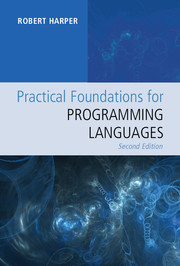Book contents
- Frontmatter
- Contents
- Preface to the Second Edition
- Preface to the First Edition
- Part I Judgments and Rules
- Part II Statics and Dynamics
- Part III Total Functions
- Part IV Finite Data Types
- Part V Types and Propositions
- Part VI Infinite Data Types
- Part VII Variable Types
- Part VIII Partiality and Recursive Types
- Part IX Dynamic Types
- Part X Subtyping
- Part XI Dynamic Dispatch
- Part XII Control Flow
- Part XIII Symbolic Data
- Part XIV Mutable State
- 34 Modernized Algol
- 35 Assignable References
- 36 Lazy Evaluation
- Part XV Parallelism
- Part XVI Concurrency and Distribution
- Part XVII Modularity
- Part XVIII Equational Reasoning
- Part XIX Appendices
- References
- Index
35 - Assignable References
from Part XIV - Mutable State
Published online by Cambridge University Press: 05 March 2016
- Frontmatter
- Contents
- Preface to the Second Edition
- Preface to the First Edition
- Part I Judgments and Rules
- Part II Statics and Dynamics
- Part III Total Functions
- Part IV Finite Data Types
- Part V Types and Propositions
- Part VI Infinite Data Types
- Part VII Variable Types
- Part VIII Partiality and Recursive Types
- Part IX Dynamic Types
- Part X Subtyping
- Part XI Dynamic Dispatch
- Part XII Control Flow
- Part XIII Symbolic Data
- Part XIV Mutable State
- 34 Modernized Algol
- 35 Assignable References
- 36 Lazy Evaluation
- Part XV Parallelism
- Part XVI Concurrency and Distribution
- Part XVII Modularity
- Part XVIII Equational Reasoning
- Part XIX Appendices
- References
- Index
Summary
A reference to an assignable a is a value, written &a, of reference type that determines the assignable a. A reference to an assignable provides the capability to get or set the contents of that assignable, even if the assignable itself is not in scope when it is used. Two references can be compared for equality to test whether they govern the same underlying assignable. If two references are equal, then setting one will affect the result of getting the other; if they are not equal, then setting one cannot influence the result of getting from the other. Two references that govern the same underlying assignable are aliases. Aliasing complicates reasoning about programs that use references, because any two references may refer to the assignable.
Reference types are compatible with both a scoped and a scope-free allocation of assignables. When assignables are scoped, the range of significance of a reference type is limited to the scope of the assignable to which it refers. Reference types are therefore immobile, so that they cannot be returned from the body of a declaration, nor stored in an assignable. Although ensuring adherence to the stack discipline, this restriction precludes using references to create mutable data structures, those whose structure can be altered during execution. Mutable data structures have a number of applications in programming, including improving efficiency (often at the expense of expressiveness) and allowing cyclic (self-referential) structures to be created. Supporting mutability requires that assignables be given a scope-free dynamics, so that their lifetime persists beyond the scope of their declaration. Consequently, all types are mobile, so that a value of any type may be stored in an assignable or returned from a command.
Capabilities
The commands get[a] and set[a](e) in MA operate on statically specified assignable a. Even to write these commands requires that the assignable a be in scope where the command occurs. But suppose that we wish to define a procedure that, say, updates an assignable to double its previous value, and returns the previous value. We can write such a procedure for any given assignable, a, but what if we wish to write a generic procedure that works for any given assignable?
- Type
- Chapter
- Information
- Practical Foundations for Programming Languages , pp. 313 - 322Publisher: Cambridge University PressPrint publication year: 2016

